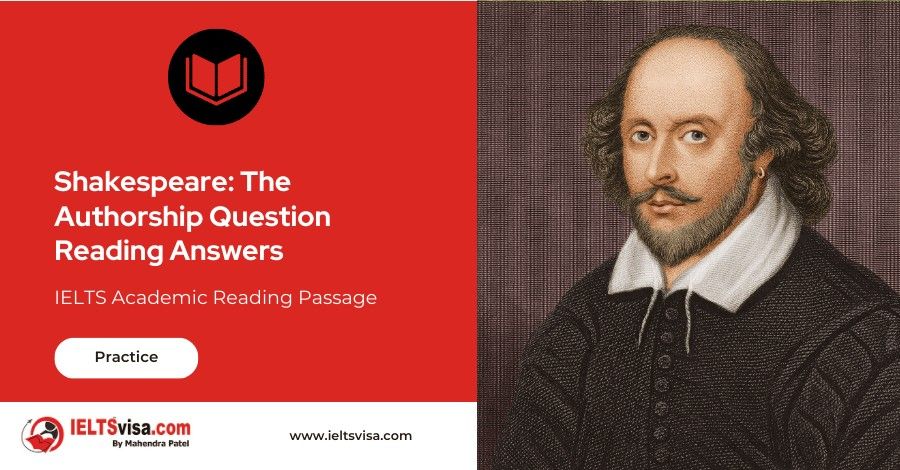Shakespeare: The Authorship Question Reading Answers
IELTS Academic Reading Passage
If one were asked to name the greatest writer in the English language, few would hesitate in answering, ‘William Shakespeare’. Although he dabbled in poetry, his central claim to fame is his plays, almost 40 of them. Extensively studied, constantly performed, adapted, and reinterpreted into modern contexts, Shakespeare’s plays remain as popular as ever. But did he write them, that is the question?
The immediate reaction is to wonder why anyone would even ask this. Although there is little documentary evidence of Shakespeare’s life, what does exist unequivocally identifies him as the author of the plays. His name appears on title pages of a few publications, printing orders, and theatrical documents, and is mentioned by contemporary commentators and a fellow playwright, both publicly and in private memoirs, in every case in a way that is consistent with Shakespeare being the author. Consequently, for hundreds of years, no one held any doubts whatsoever on the matter.
There it would have remained, had Shakespeare’s post-humous reputation not reached such lofty heights. With the widespread acceptance of his dramatic genius, apparent inconsistencies were perceived. Chief among these was how such literature could originate from, as viewed by some, a humble ill-educated country bumpkin and bawdy stage entrepreneur, about whom so little was known. Details of Shakespeare’s schooling and upbringing in the small market town of Stratford-Upon-Avon are non-existent, but among his surviving children there is no evidence of strong education or even basic literacy skills. No original written texts have ever been found, and Shakespeare’s six surviving signatures are all unsteady, showing inconsistent style and spelling.
Most tellingly for some are the circumstances of Shakespeare’s death. Firstly, there is his will, a commonplace and unpoetic document, making no mention whatsoever of the considerable body of papers, reference books, and miscellaneous plays, poetry, and writings that one would expect a playwright of Shakespeare’s stature to possess. Apparently he was unconcerned about the rights to both his own plays (many of which remained unpublished at that time) and his own literary heritage. The second fact is that, upon his death, there were no eulogies, mourning notices, or testimonies from those who knew him. All this seems very perplexing for a playwright and poet who, whilst not necessarily considered the most polished, professional, or learned by his peers, had nevertheless achieved considerable wealth, respect, and fame, even in his own lifetime.
Such thoughts first became public in the mid-19th century — and have never really slopped, developing the grand title, ‘The Shakespeare authorship question”, and dividing those interested into two sides: the Stratfordians: those who support Shakespeare as the author, and the anti-Stratfordians: those who do not. For the latter body, the only way to overcome the documentary evidence in support of Shakespeare’s authorship is to assume a conspiracy existed among a select group of people, perhaps including Shakespeare himself, in order to protect the real author’s identity. So who was he (and in those times, it goes without saying that it could not be a ‘she’)?
The anti-Stratfordians search for a university-educated, upper-class candidate — someone who would inevitably have had knowledge of aristocratic manners and mores, and familiarity with the proceedings and politics of the royal court, all of which so often appear in the plays themselves. The reason for the conspiracy is that producing such works, full with themes of royal revenge and murder, intrigue and assassination, mob rule and rebellion, could render a nobleman liable to the dangerous charge of subversion. Some have also argued that, at that time, it was considered socially unacceptable for the upper-class to publish creative literature for monetary gain, being instead confined to circulating their writings among their peers, or seeing them performed among courtly audiences.
There are four leading contenders. Sir Francis Bacon was the first nominated, and certainly had the best intellectual credentials, being well-versed in law, philosophy, essay writing, and science. However, since the 1920s, Edward de Vere, an aristocratic earl who patronised and sponsored actors and the arts, has become the leading contender. Only slightly less favoured is a fellow playwright, Christopher Marlowe. Born into the same social class as Shakespeare, he at least went to university, although his early death in a tavern brawl presents difficulties — unless one assumes his demise was fabricated to allow him to continue writing under Shakespeare’s name. Finally, there is William Stanley, another aristocratic earl. Contemporary accounts attest to the fact that he wrote plays for the common people, and throughout his life he displayed interest and support for the theatre.
And the evidence? Mere historical and literary conjecture, vague similarities in writing styles, and loose coincidences between the lives and travels of these contenders when compared to the scenes and settings of many of the plays in question. In other words, nothing solid at all. The case is so flimsy that reputable scholars barely discuss it, and rightly so. Although capable of attracting public interest and selling books, unless some real evidence emerges, I would say that the authorship question is not questionable at all.
Questions 14-17
Write TRUE, FALSE, or NOT GIVEN.
| TRUE | if the statement agrees with the information |
| FALSE | if the statement contradicts the information |
| NOT GIVEN | If there is no information on this |
14 Shakespeare’s name appears on many documents.
15 He was considered a genius even in his lifetime.
16 He was well-educated.
17 When he died, not all the plays had been published.
Questions 18-21
Complete the sentences.
Choose ONE WORD from the passage for each answer.
We have six examples of Shakespeare’s 18………………….
He used ordinary language in his 19………………….
The lack of public grieving upon his death is 20………………….
Those who believe Shakespeare was not the author are called 21………………….
Questions 22-24
Complete the flowchart.
Choose NO MORE THAN THREE WORDS from the passage for each answer.

- …………………..
- ………………….
- ………………….
Questions 25-26
Choose the correct letter, A, B, C, or D.
25 Which sentence was mentioned in the reading passage?
A Sir Francis Bacon was the smartest of the candidates.
B Edward de Vere was in the same social class as Shakespeare.
C Christopher Marlowe is the prime candidate.
D William Stanley wrote plays for courtly audiences.
26 The author believes that Shakespeare
A did not write the plays.
B may not have written the plays.
C probably wrote the plays.
D certainly wrote the plays.

Solution For: Shakespeare: The Authorship Question
Reading Answers
| 14 FALSE | 15 FALSE |
| 16 NOT GIVEN | 17 TRUE |
| 18 signature(s) | 19 will |
| 20 perplexing | 21 anti-Stratfordians |
| 22 socially unacceptable | 23 protect (his) identity |
| 24 documentary evidence | 25 A |
| 26 D |
Review and Practice
- Regularly practice with IELTS reading samples and time yourself to get used to the pressure of the exam.
- Review your mistakes to understand where you went wrong and how to avoid similar errors in the future.
Our Books
Master IELTS Speaking Part 1
IELTS Writing Task 1 Book
IELTS Writing Task 2 Book
Shakespeare: The Authorship Question Reading Answers Explanation
Comin Soon
Practice IELTS Other Modules
IELTS Listening
The IELTS Listening test assesses how well you can understand spoken English in various contexts. It lasts about 30 minutes and is divided into four sections with a total of 40 questions. The listening tasks become increasingly difficult as the test progresses.
IELTS Academic Reading
The IELTS Academic Reading section assesses your ability to understand and interpret a variety of texts in academic settings. It is designed to evaluate a range of reading skills, including skimming for gist, reading for main ideas, reading for detail, understanding inferences, and recognizing a writer's opinions and arguments.
IELTS Speaking
The IELTS Speaking test assesses your ability to communicate in English on everyday topics. It lasts 11-14 minutes and consists of three parts: introduction, cue card, and a discussion based on the cue card topic.
IELTS General Reading
IELTS General Reading tests your ability to understand and interpret various types of texts. Here are some key areas and types of content you can expect to encounter in the reading section, along with tips for effective preparation.
IELTS Academic Writing Task 1
In IELTS Academic Writing Task 1, you are presented with a visual representation of information, such as graphs, charts, tables, or diagrams, and you are required to summarize, compare, or explain the data in your own words.
IELTS General Writing Task 1
In IELTS General Writing Task 1, you are required to write a letter based on a given situation. The letter can be formal, semi-formal, or informal, depending on the prompt. Here’s a breakdown of the key components to include in your letter
IELTS Academic Writing Task 2
In IELTS Academic Writing Task 2, you are required to write an essay in response to a question or topic. Here’s a guide to help you understand the essential elements of this task
IELTS Exam Tips
To succeed in the IELTS exam, practice regularly, familiarize yourself with the test format, improve your vocabulary, develop time management skills, and take mock tests to build confidence.
Grammer for IELTS
Grammar is the foundation of effective communication in English. Understanding tense usage, subject-verb agreement, and sentence structure enhances clarity and coherence in writing and speaking.
Vocabulary for IELTS
Vocabulary plays a crucial role in the IELTS (International English Language Testing System) exam, especially in the Speaking and Writing sections. Here’s an overview of why vocabulary is important and how it impacts your performance
RECENT IELTS SAMPLES QUESTIONS AND ANSWERS
Walking with dinosaurs
Peter L. Falkingham and his colleagues at Manchester University are developing techniques that...
Money as the Unit of Amount Reading Answers
The most difficult aspect of money to understand is its function as a unit of account. In...
WEATHERING IN THE DESERT
In the deserts, as elsewhere, rocks at the earth's surface are changed by weathering, which...
Nature on Display in American Zoos
The first zoo in the United States opened in Philadelphia in 1874, followed by the Cincinnati...
Can We Prevent the Poles From Melting
Such is our dependence on fossil fuels, and such is the volume of carbon dioxide we have...
Air conditioning the earth reading answers
The circulation of air in the atmosphere is activated by convection, the transference of heat...













